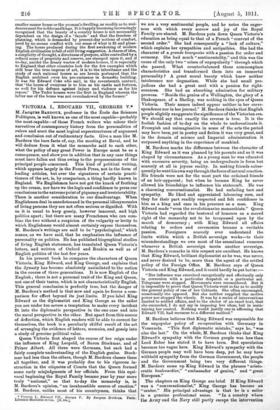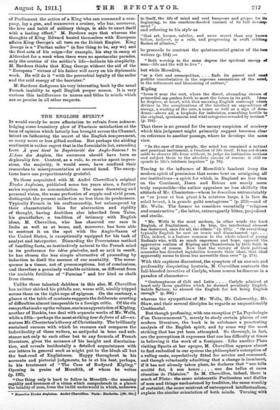VICTORIA I., EDOLTARD VIL, GEORGES V.* M. JAcquEs Beanoux, professor
in the Ecole des Sciences Politiques, is well known as one of the most capable—probably the most capable—of those French writers who colour their narratives of contemporary history from the personalities of rulers and erect the most logical superstructures of argument and conclusion out of rudimentary facts. Give a man like M. Bardoux the bare facts of, say, the meeting at Reval, and he will deduce from it what the monarchs said to each other, what the policy of any great Power in Europe must be as a consequence, and show you in addition that in any case things must have fallen out thus owing to the prepossessions of the principal people concerned. This kind of political writing, which appears largely in the French Press, not in the form of leading articles, but over the signatures of certain practi- tioners of the art, is, by comparison, a thing hardly known in England. We Englishmen have not got the knack of frothing up the cream, nor have we the logic and confidence to press our conclusions tothe extreme pointof piquancy and irretrievability. There is another consideration to our disadvantage. When Englishmen deal in anecdotesand in the personal idiosyncrasies of living persons they are not often serious or dignified. With us it is usual to keep gossip, however innocent, and high politics apart; but there are many Frenchmen who can com- bine the two without a suspicion of the vulgarity or levity to which Englishmen would almost certainly expose themselves. M. Bardonx's writings are said to be "psychological," which means, as we have said, that he emphasizes the influence of personality on politics. He has published biographical studies of living English statesmen, has translated Queen Victoria's letters, and written of Oxford and Ruskin as well as of English politics of the last few years.
In his present book he compares the characters of Queen Victoria, King Edward, and King George, and explains that the dynasty has become absolutely assimilated to the nation in the course of three generations. It is now English of the English ; there is not a personal trait of the King and Queen, not one of their tastes, which is not characteristically English. This general conclusion is perfectly true, but the danger of M. Bardoux's method is that now and again he forces a com- parison for effect beyond its just limits. If you label King Edward as the diplomatist and King' George as the sailor you are under too severe a temptation to make every incident fit into the diplomatic perspective in the one case and into the naval perspective in the other. But apart from this source of deflection, which English readers will be able to correct for themselves, the book is a peculiarly skilful result of the art of arranging the evidence of letters, memoirs, and gossip into a study of genuine political value.
Queen Victoria first shaped the course of her reign under the influence of King Leopold, of Baron Stockmar, and of Prince Albert. All three were Germans, but each had a fairly complete understanding of the English genius. Stock- mar had less than the others, though M. Bardoux classes them all together, and it was probably due to his rigorous in- struction in the etiquette of Courts that the Queen formed some early misjudgments of her officials. From this equi- vocal beginning the Royal Family became year by year more truly "national," so that to-day the monarchy is, in M. Bardoux's opinion, "an inexhaustible source of emotion." M. Bardoux, unlike most of his countrymen, thinks that
• Victoria L, Edouard VII., Georges V. By Jacques Budoux. Paris; Librairie Hachette et Cio. 400.1
we are a very sentimental people, and he notes the eager- ness with which every sorrow and joy of the Royal Family are shared. IL Bardoux puts down Queen Victoria's education as being equal to that of a French " convent of the second order." She had consequently a "lack of culture," which explains her sympathies and antipathies. She had the character of a grande bourgeoise with a passion for order and economy. She had much "sentimentality," and this was the cause of the only two "crises of unpopularity" through which she passed. What counterbalanced these commonplace characteristics and transformed them into an immortal personality P A great moral beauty which knew neither intolerance nor dogmatism. While she bad small pre- judices she had a great soul with a passion for right- eousness. She bad an absorbing admiration for military
prowess. "Beside the genius of a Wellington, the glory of a Shakespeare, of a Shelley, was nothing in the eyes of Queen Victoria. Their names indeed appear neither in her corre-
spondence nor in her journal." M. Bardoux thinks that English people slightly exaggerate the significance of the Victorian era.
We should say that exactly the reverse is true. It is the foolish fashion of to-day on the whole to underestimate it.
Frumpish and unimaginative in some of the arts the period may have been, yet in poetry and fiction it was very great, and in the domain of science and Imperial administration it surpassed anything in the experience of mankind.
M. Bardonx marks the difference between the character of King Edward as it was planned by his parents and as it was
shaped by circumstances. As a young man he was educated with excessive severity, being an undergraduate in form but scarcely at all in joyous reality. In making friends subse- quently he went h is own way th rough the force of natural reaction. His friends were not for the most part the ordained friends of an heir-apparent ; but when he became King he never allowed his friendships to influence his statecraft. He was a charming conversationalist. He had unfailing tact and sympathy. He liked and appreciated labouring men, and they for their part readily respected and felt confidence in him as a king and ease in his presence as a man. King Edward made "even the revolutionaries monarchists." Queen Victoria had regarded the bestowal of honours as a sacred right of the monarchy not to be trespassed upon by the march of democracy ; with King Edward all affairs relating to orders and ceremonies became a veritable passion. Foreigners scarcely ever understand the limits within which a British sovereign works—to their misunderstandings we owe most of the sensational rumours whenever a British sovereign meets another sovereign. M. Bardoux's remarks in this respect are excellent. He knows that King Edward, brilliant diplomatist as he was, was never, and never desired to be, more than the agent of the settled policy of the Foreign Office. M. Bardoux says of Queen Victoria and King Edward, and it could hardly be put better :—
" Her influence was exercised energetically and effectually only in connexion with a particular despatch or a particular act. Telegrams were stopped. Movements were reconsidered. But it is impossible to prove that Queen Victoria went so far as to modify the general policy of one of her Cabinets. She often encouraged, occasionally she opposed.. But she neither supplied the motive power nor stopped the wheels. It was by a series of interventions limited to settled affairs, and to the choice of an exact text, that she succeeded, I do not say in imposing her ideas, but in main; taming her control. Nothing would justify one in affirming that Edward VII. had recourse to a different method."
M. Bardoux believes that King Edward was responsible for the unpopular policy of co-operation with Germany in Venezuela. " This first diplomatic mistake," says he, "was also the last." On the whole, M. Bardoux thinks that King Edward's sympathy with the German people was lese. than Lord Esher has stated it to have been. But speculation becomes too vague here. King Edward's sympathy with the German people may well have been deep, yet he may have withheld sympathy from the German Government, the people and the Government being two very different things. M. Bardonx sums up King Edward in the phrases "aristo- cratic boulevardier," "ambassador of genius," and " great E uropean."
The chapters on King George are brief. If King Edward
was a "conversationalist," King George has become an "orator." His principal advantage is that be is a sailor in a genuine professional sense. "In a country where
the Army and the Navy still partly escape the intervention of Parliament the action of a King who can command a com- pany, lay a gun, and manoeuvre a cruiser, who has, moreover, the love and habit of military things, is able to exert itself with a lasting effect." M. Bardoux says that whereas the thoughts of King Edward busied themselves with European affairs King George's all turn on the British Empire. King George is a " Puritan sailor " (a fine thing to be, say we) and the first acts of his reign—for example, his stay in camp at Aldershot for a week when there were no spectacular parades, only the routine of the soldier's life—indicate his simplicity. M. Bardoux thinks that King George without the aid of the " European " virtues of his father will carry on his diplomatic work. He will do it " with the proverbial loyalty of the sailor and the cold energy of the barrister."
M. Bardoux disfigures his very interesting book by the usual French inability to spell English proper names. It is very curious this indifference to names and titles in minds which are so precise in all other respects.







































 Previous page
Previous page